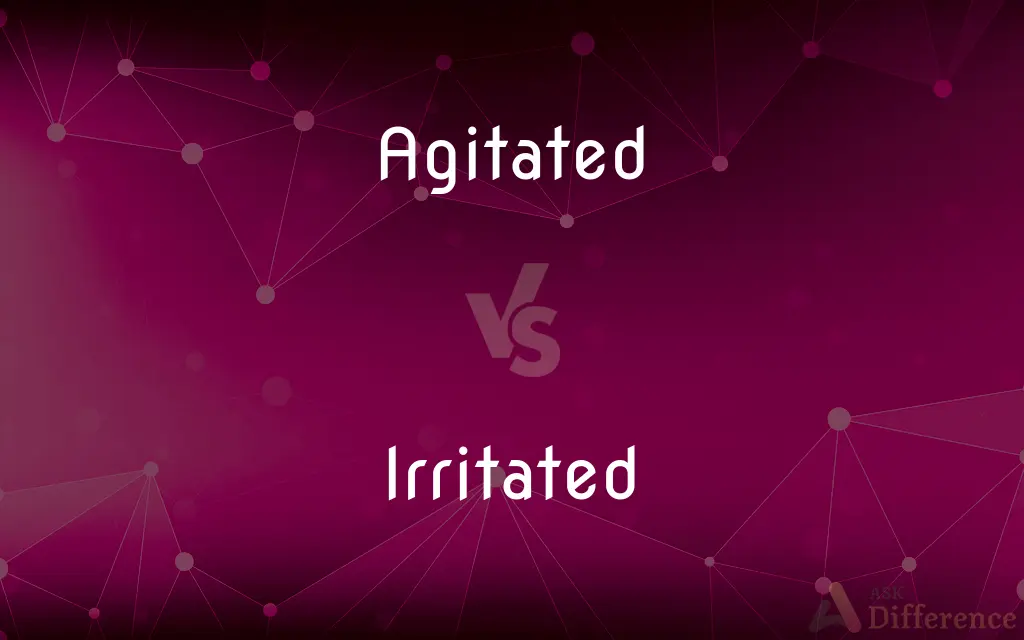Agitated vs. Irritated — What's the Difference?
By Fiza Rafique & Urooj Arif — Updated on March 8, 2024
Agitated refers to a state of nervousness or unrest, while irritated signifies annoyance or mild anger.

Difference Between Agitated and Irritated
Table of Contents
ADVERTISEMENT
Key Differences
Agitated describes a state of being emotionally disturbed or excited, often manifesting as physical restlessness or unease. It's commonly associated with a wide range of emotions, from anxiety to excitement, and can be triggered by internal or external factors such as personal stress or external provocations. On the other hand, irritated refers to a feeling of annoyance or discomfort, usually as a reaction to a specific irritant. This condition is more about a direct response to something deemed annoying, bothersome, or offensive.
Agitated states can sometimes lead to physical symptoms such as increased heart rate, sweating, or trembling, as the body reacts to the emotional stress. These physical manifestations are part of the body's fight-or-flight response, indicating a high level of emotional unrest or disturbance. Whereas, irritation might not always manifest physically in the same way agitation does. Instead, it might present through verbal expressions of annoyance or through behaviors that indicate a desire to remove the source of irritation, such as avoiding a noisy environment or expressing displeasure towards a certain action or event.
One key difference between being agitated and irritated is the source and intensity of the emotional response. Agitation can be caused by a variety of factors, both internal and external, and tends to be more intense and encompassing. It can envelop one's entire emotional state, affecting thoughts, feelings, and physical condition.
Irritated, however, is usually triggered by a specific external factor and is characterized by a less intense, though still unpleasant, emotional reaction. The feeling of irritation is more about being bothered by something rather than being overwhelmed by a mix of emotions.
Comparison Chart
Emotional Scope
Broad, encompassing various emotions
Focused on annoyance or mild anger
ADVERTISEMENT
Manifestation
Both physical (shaking, pacing) and emotional
Primarily emotional, sometimes verbal
Duration
Can be long-lasting, depending on the cause
Usually short-term, until irritant is removed
Intensity
Higher, can involve anxiety, excitement, etc.
Lower, limited to annoyance or discomfort
Cause
Both internal (stress, anxiety) and external
Primarily external (specific annoyances)
Compare with Definitions
Agitated
Exhibiting restless or fidgety behaviors.
He paced back and forth in an agitated manner.
Irritated
Feeling bothered by someone or something.
She felt irritated at the interruption.
Agitated
Showing signs of anxiety or stress.
Her voice was agitated and shaky.
Irritated
Annoyed or angered slightly.
He was irritated by the constant noise.
Agitated
A state of excitement or disturbance.
The crowd became agitated at the news.
Irritated
Reacting negatively to an annoyance or discomfort.
His eyes were irritated from the smoke.
Agitated
Emotionally stirred up.
The controversial topic left many feeling agitated.
Irritated
Showing signs of annoyance.
Her irritated tone made her displeasure clear.
Agitated
Feeling or appearing troubled or nervous.
She was visibly agitated during the meeting.
Irritated
Exhibiting impatience or dissatisfaction.
He responded in an irritated manner to the questions.
Agitated
To cause to move with violence or sudden force.
Irritated
To cause (someone) to feel impatient or angry; annoy
A loud, bossy voice that irritates listeners.
Agitated
To upset; disturb
Was agitated by the alarming news.
Irritated
To make sore or inflamed
The smoke irritated my eyes.
Agitated
To arouse interest in (a cause, for example) by use of the written or spoken word; discuss or debate.
Irritated
(Physiology) To cause a physiological response to a stimulus in (a cell, body tissue, or organism).
Agitated
To stir up public interest in a cause
Agitate for a tax reduction.
Irritated
To be a cause of impatience or anger.
Agitated
Simple past tense and past participle of agitate
Irritated
Simple past tense and past participle of irritate
Agitated
Angry, annoyed, bothered or worked up.
Irritated
Experiencing a feeling of irritation.
Agitated
(of a solution or substance) Violently and chaotically moving around, such as because of being shaken.
Irritated
(pathology) Inflamed and painful.
Agitated
Troubled emotionally and usually deeply. Opposite of unagitated.
Irritated
Aroused to impatience or anger; as, made an irritated gesture.
Agitated
Throwing oneself from side to side.
Irritated
Feeling inflammation or other discomfort (especially in a part of the body)
Agitated
Physically disturbed or set in motion; as, the agitated mixture foamed and bubbled. Opposite of unagitated and left alone, allowed to stand.
Irritated
Aroused to impatience or anger;
Made an irritated gesture
Feeling nettled from the constant teasing
Peeved about being left out
Felt really pissed at her snootiness
Riled no end by his lies
Roiled by the delay
Agitated
Troubled emotionally and usually deeply;
Agitated parents
Agitated
Physically disturbed or set in motion;
The agitated mixture foamed and bubbled
Agitated
Thrown from side to side;
A tossing ship
Common Curiosities
What causes a person to become agitated?
A variety of factors, including stress, anxiety, external pressures, or emotional disturbances.
How can one tell if they are irritated?
By recognizing feelings of annoyance or discomfort towards a specific situation or behavior.
Is it possible to feel both agitated and irritated at the same time?
Yes, since agitation can encompass irritation as one of its many emotional responses.
What typically causes irritation?
Specific external annoyances, such as a loud noise or an interrupting individual.
How can one manage feelings of agitation?
Through relaxation techniques, addressing the underlying cause, or seeking professional help.
Can irritation affect one’s health?
While generally less severe than agitation, chronic irritation can lead to stress and affect mental health.
Are agitation and irritation the same?
No, agitation encompasses a broader range of emotions including nervousness and unrest, while irritation is specifically about annoyance.
Can agitation lead to physical symptoms?
Yes, including increased heart rate, sweating, or trembling due to emotional stress.
What are some common reactions to irritation?
Verbal expressions of annoyance, avoidance behaviors, or seeking to remove the irritant.
Can external factors alone cause agitation?
Yes, though internal factors like stress and anxiety are also common causes.
What role does patience play in managing irritation?
Patience can help mitigate the impact of irritants and reduce the intensity of the emotional response.
Are there long-term effects of repeatedly feeling agitated or irritated?
Yes, chronic emotional stress from either state can lead to health issues, including mental health disorders.
Is agitation more serious than irritation?
Generally, yes, due to its broader emotional impact and potential physical manifestations.
How do agitation and irritation affect relationships?
Both can lead to misunderstandings and conflicts if not properly communicated or managed.
How does one’s environment influence feelings of agitation or irritation?
A stressful or uncomfortable environment can significantly increase the likelihood of both agitation and irritation.
Share Your Discovery

Previous Comparison
Joined vs. Joint
Next Comparison
Electron vs. PhotonAuthor Spotlight
Written by
Fiza RafiqueFiza Rafique is a skilled content writer at AskDifference.com, where she meticulously refines and enhances written pieces. Drawing from her vast editorial expertise, Fiza ensures clarity, accuracy, and precision in every article. Passionate about language, she continually seeks to elevate the quality of content for readers worldwide.
Co-written by
Urooj ArifUrooj is a skilled content writer at Ask Difference, known for her exceptional ability to simplify complex topics into engaging and informative content. With a passion for research and a flair for clear, concise writing, she consistently delivers articles that resonate with our diverse audience.















































